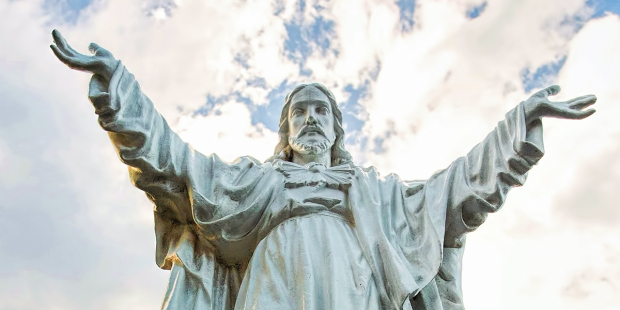Podcast: Play in new window | Download
Subscribe: Email | TuneIn | RSS | More
By: Brian G. Chilton and Curtis Evelo | March 11, 2022
During the winter months, the Bellator Christi Podcast examines a major arm of systematic theology. For this Winter Theology Series, we are exploring Christology–that is, the study of Christ. This week Brian and Curtis look into the ascension of Jesus.
- What are we talking about when we mention the ascension of Jesus?
- What details do we know about the ascension of Jesus from Scripture?
- Mark 16:19
- Luke 24:50-53
- Acts 1:6-11
- Even though the 40 day appearances were literal historical events, what spiritual representation does the number 40 hold?
- Were ascension accounts mentioned in the OT? (Enoch–Gen. 5:21-24; Elijah–2 Kings 2:1-12)
- Does the NT mention the ascension in other accounts?
- Eph. 2:5-6
- Phil. 2:9
- 1 Tim. 3:16
- Heb. 4:14
- Heb. 1:13
- Heb. 10:13
- 1 Pet. 1:21; 3:22
- Rev. 5:6, 11-13
- Rev. 11:1-13
- What is the significance of Christ sitting at the right hand of God?
- What eschatological significance does Christ’s ascension hold?
- Acts 1:11
- Zech. 14:4
Brian G. Chilton, PhD Cand: Founder of Bellator Christi Ministries, President, Contributor, and Co-host of the Bellator Christi Podcast

Brian G. Chilton is a Ph.D. Candidate in the Theology and Apologetics program at Liberty University. He is the host of The Bellator Christi Podcast and the founder of Bellator Christi. He received his Master of Divinity in Theology from Liberty University (with high distinction); his Bachelor of Science in Religious Studies and Philosophy from Gardner-Webb University (with honors); earned a Certificate in Christian Apologetics from Biola University, and plans to purse philosophical studies in the near future. Brian is a member of the Evangelical Theological Society and the Evangelical Philosophical Society.
Brian has served in pastoral ministry for nearly 20 years and currently serves as a clinical hospice chaplain. Additionally, he serves as an editor for the Eleutheria Journal and is an Associate Editor for MoralApologetics.com. At the prompting of the Lord, Brian established Bellator Christi Ministries in 2012. The ministry is aimed to provide readily available resources in theology, apologetics, biblical studies, and philosophy for those who want to know what Christianity teaches and why it should be believed. In 2019, Brian published his first book entitled the Layman’s Manual on Christian Apologetics. After finishing his Ph.D., Brian intends to publish more books. His areas of expertise include early NT creeds, near-death experiences, biblical reliability, the blend of divine sovereignty and human freedom, and the need for empathy.
Curtis Evelo: Co-Host and Producer of the Bellator Christi Podcast

Curtis Evelo is a cattle rancher at the E6 Hereford Ranch in St. Ignatius, Montana. Curtis is the Co-Host and Producer of the Bellator Christi Podcast. He often teaches and speaks at his church Cornerstone Faith Center in St. Ignatius. Curtis provides a common-sense approach to Christianity as he contemplates the wonders of God’s creation in Big Sky Country.
Other Episodes from this Series:
Brian Chilton and Curtis Evelo, “Christology (Part 1): The Union of Christ’s Divine and Human Nature,” BellatorChristi.com (January 13, 22), https://bellatorchristi.com/2022/01/14/s5-e13-christology-part-one-the-union-of-christs-divine-and-human-nature/
Brian Chilton and Curtis Evelo, “Christology (Part 2): The Virgin Birth and the Incarnation of Christ,” BellatorChristi.com (January 19, 2022), https://bellatorchristi.com/2022/01/19/s5-e14-christology-part-2-the-virgin-birth-and-incarnation-of-christ/
Brian Chilton and Curtis Evelo, “Christology (Part 3): Early Christological Titles,” BellatorChristi.com (January 26, 2022), https://bellatorchristi.com/2022/01/26/s5-e15-christology-part-3-early-christological-titles/.
Brian Chilton and Curtis Evelo, “Christology (Part 4): Theories of the Atonement,” BellatorChristi.com (February 3, 2022), https://bellatorchristi.com/2022/02/03/s5-e16-christology-part-4-theories-of-the-atonement/
Brian Chilton and Curtis Evelo, “Christology (Part 5): Testing Atonement Theories with Scripture,” BellatorChristi.com (February 9, 2022), https://bellatorchristi.com/2022/02/09/s5-e17-christology-part-5-testing-atonement-theories-with-scripture/
Brian Chilton and Curtis Evelo, “Christology (Part 6): The Work and Functions of Christ,” BellatorChristi.com (2/16/22), https://bellatorchristi.com/2022/02/16/s5-e18-christology-part-6-the-work-and-functions-of-christ/
Brian Chilton and Curtis Evelo, “Christology (Part 7): The Extent of Christ’s Atonement,” BellatorChristi.com (2/23/22), https://bellatorchristi.com/2022/02/23/s5-e19-christology-part-7-the-extent-of-christs-atonement/
Brian Chilton and Curtis Evelo, “Christology (Part 8): The Resurrection of Jesus,” BellatorChristi.com (3/2/22), https://bellatorchristi.com/2022/03/03/s5-e20-christology-part-8-the-resurrection-of-jesus/
© 2022. BellatorChristi.com.






I referenced “inerrancy” because in my experience, it is mostly inerrantists who exhibit a “fight and die” type attitude of upholding the bible’s historical reliability (though I’ve reviewed works by non-inerrantists who get close, like Lydia McGrew’s “eye of the beholder”). Therefore, inerrantists and those who view the bible as historically reliable would never agree that perhaps apostle Matthew doesn’t mention the ascension because he didn’t know about it. That would suggest that Acts 1 is wrong when saying all apostles watched as Jesus ascended.
So…can a person possibly be reasonable to conclude, even if only tentatively, that the reason Matthew, Mark and John don’t mention the ascension mentioned in Acts 1 is because they never knew Jesus did any such thing?
Yes, that hurts both bible inerrantists, and non-inerrantisits with a high view of bible reliability, because it suggests either Acts 1 is wrong, or these gospel authors had severe amnesia, either of which theory would wreak havoc for Christian apologeics, but aside from that, I’m not seeing what’s “unreasonable” about somebody interpreting those gospel authors’ silences that way.
then why don’t Matthew, Mark and John mention the ascension? Is the inerrantist’s explanation for their silence the only possibly reasonable one?
Two things stand out: 1) The ascension already holds multiple independent attestation even without Matthew, Mark, and John. However, I would imagine that there may be allusions to the ascension in these three Gospels. But to be honest, I have not explored whether they do, so I cannot say with any degree of certainty. 2) I am unsure what this issue has to do with biblical inerrancy. Even if one text mentions the ascension and it proves to be true, then inerrancy is upheld. I am unsure why one must hold to inerrancy to advocate this position.
“There are numerous allusions to the ascension in the Pauline and General Epistles. The Pauline Epistles are earlier than the Gospels and contain some of the earliest material in all the NT.”
——-I think you misunderstand what’s going on: you think the traditions recounted in the gospel text existed between the time Jesus “rose” and the time Paul converted. So your own presumption is that the gospels were authored by persons working with material much earlier than anything Paul could possibly contribute. Therefore it is the gospel authors, working with pre-Pauline traditions, who are failing to mention the ascension.
“I would recommend going back and re-listening to the podcast, because we covered a lot of Scripture references that would answer your question.”
——–You don’t say anything in the podcast about whether a skeptic can be reasonable to deny the ascension on the grounds that three gospel authors don’t mention it. Once again, arguments from silence, like any hypothesis, can be “reasonable” even if they don’t prove infallible.
Barry, you completely missed the point. Luke engages early traditions and mentions the ascension as do the Epistles when quoting or alluding to early Jesus traditions and creeds. The ascension is most certainly found in these creeds and early Jesus traditions, as noted in the podcast. They even postulate that Jesus sat at the right hand of God the Father, something that is subsequent to the ascension. Unless you trash all the data that favors the ascension–a deed that would be naive at best, dishonest at worst–then you must accept that the earliest traditions do include the ascension of Jesus. For this reason, Richard Bauckham deduced that the “earliest Christology is the highest Christology” (Bauckham, Jesus and the God of Israel, x, 235).
Don’t you find it slightly suspicious that neither Matthew, Mark nor John say that Jesus’ resurrection was followed by his ascension?
I don’t believe in biblical inerrancy, so how could I be unreasonable in saying these gospel authors don’t mention an ascension-following-resurrection is beause they ever don’t know of any such thing (which suggests Luke is fictionalizing), or they think it false (suggesting Luke is wrong)?
Sure, that’s an argument from silence, but arguments from silence are not automatically fallacious, historians use them all the time, and the issue is not whether the argument from silence makes us arrive at truth, but whether the argument from silence is merely “reasonable”.
There are numerous allusions to the ascension in the Pauline and General Epistles. The Pauline Epistles are earlier than the Gospels and contain some of the earliest material in all the NT. I would recommend going back and re-listening to the podcast, because we covered a lot of Scripture references that would answer your question.
[…] Source: (S5 E21) Christology (Part 9): The Ascension of Jesus […]